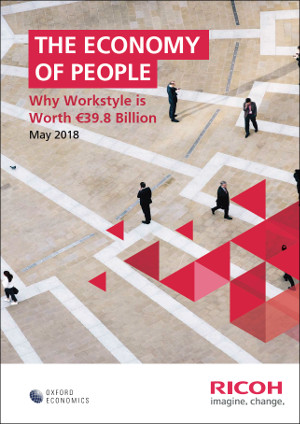Ungated Post | 30 May 2018
The Economy of People

The UK and Ireland in 2018 are facing a critical productivity challenge. To unlock our full potential we need to develop a deep understanding of people and their ability to drive the economy through the way they work. Converting this understanding into optimal workplaces could boost GDP by £39.8Bn.
The research, carried out by Oxford Economics and written up by Ricoh, outlines the path towards building the optimal workplace. It explores the current effectiveness of workplace strategies and opportunities to create greater alignment between employee needs and executive decision-making. We found that emotional factors, namely culture, drive employee performance and are a catalyst for creative thinking. On the other end of the spectrum, technology proved to be critical to ensuring high output-per-hour, or productivity. The physical, which translates to the workspace and office setting, is the bridge between performance and productivity, thereby influencing both.
By understanding performance, productivity and the link between the two, we were able to forecast a potential 1.8% and 1.0% increase in UK and Ireland GDP, respectively. Together, these numbers translate to a €39.8 billion increase in GDP that the United Kingdom and Ireland could potentially realise through optimal workplaces.
Oxford Economics’ team is expert at applying advanced economic tools that provide valuable insights into today’s most pressing business, financial, and policy issues.
To find out more about our capabilities, contact:
Americas
Diantha Redd
+1 (646) 503 3052
Email
Asia Pacific
Peter Suomi
+65 6850 0110
Email
EMEA
Aoife Pearson
+44 (0)203 910 8054
Email
Related Services

Post
KPMG M&A Outlook 2026: Between Uncertainty, Resilience, and Seizing Opportunities
Discover how Germany’s M&A landscape is evolving – with a focus on growth, AI and post-merger value creation.
Find Out More
Post
Silver, the next generation metal
This report highlights the critical role silver plays in data centres and artificial intelligence (AI), automotive and electric vehicles (EVs), and solar energy photovoltaics (PVs). With these sectors expected to expand significantly over the coming years, we expect future silver demand to be strong.
Find Out More
Post
Powering the UK Data Boom: The Nuclear Solution to the UK’s Data Centre Energy Crunch
The UK’s data centre sector is expanding rapidly as digitalisation, cloud computing, and artificial intelligence (AI) drive surging demand for high-performance computing infrastructure.
Find Out More